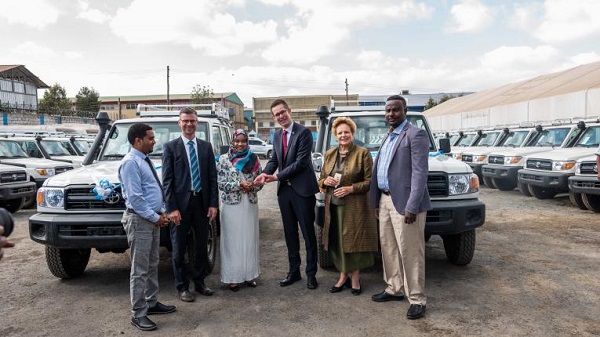
ADDIS ABABA (UNICEF)–The Government of the Federal Republic of Germany and UNICEF handed over 30 vehicles to the Afar and Somali Regional Health Bureaus for the provision of mobile health and nutrition services to children.
The Somali Region received 19 vehicles and the remaining 11 went to Afar Region. The vehicles will be used by Mobile Health and Nutrition Teams in the two regions to reach children in remote and hard-to-reach areas with essential lifesaving services. It is expected that the cost of running the teams will also be significantly reduced since it will cut out vehicle rentals.
“Child health and nutrition indicators in these two regions are the lowest in the country,” said Gillian Mellsop, UNICEF Representative in Ethiopia. “With this contribution, together with the Government of Ethiopia and other partners, we will ensure that every child is reached with essential and lifesaving health and nutrition services. No child should be left behind because of where they live or their socio-economic circumstances.”
“In German Development Cooperation, we always strive to provide context specific support that reaches those most in need,” said Hanspeter Schwär, Head of Cooperation at the German Embassy. “The mobile health and nutrition units are a perfect example of leaving no child behind. Strengthening resilience is a challenge that we can only tackle together. We are very glad to have UNICEF as a strong and trusted partner for our development bank KfW to work with and together with the Ethiopian Government to build resilient health systems. We all want the same: healthy parents and healthy children.’
Mobile Health and Nutrition Teams were established by the Government of Ethiopia in 2006 to provide health, nutrition, and water and sanitation services to vulnerable communities in inaccessible and remote areas. In recent years, the teams have played a key role in reaching pastoralist and agro-pastoralist communities affected by droughts.
The UNICEF supported Mobile Health and Nutrition Teams have grown from an initial 16 in 2006 to the current 49, all based in Somali and Afar regions. In 2018, the teams provided 500,000 medical consultations in the two regions, thus ensuring that malnutrition and other diseases were prevented or treated in a timely manner.
Source: UNICEF Ethiopia
